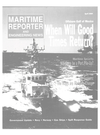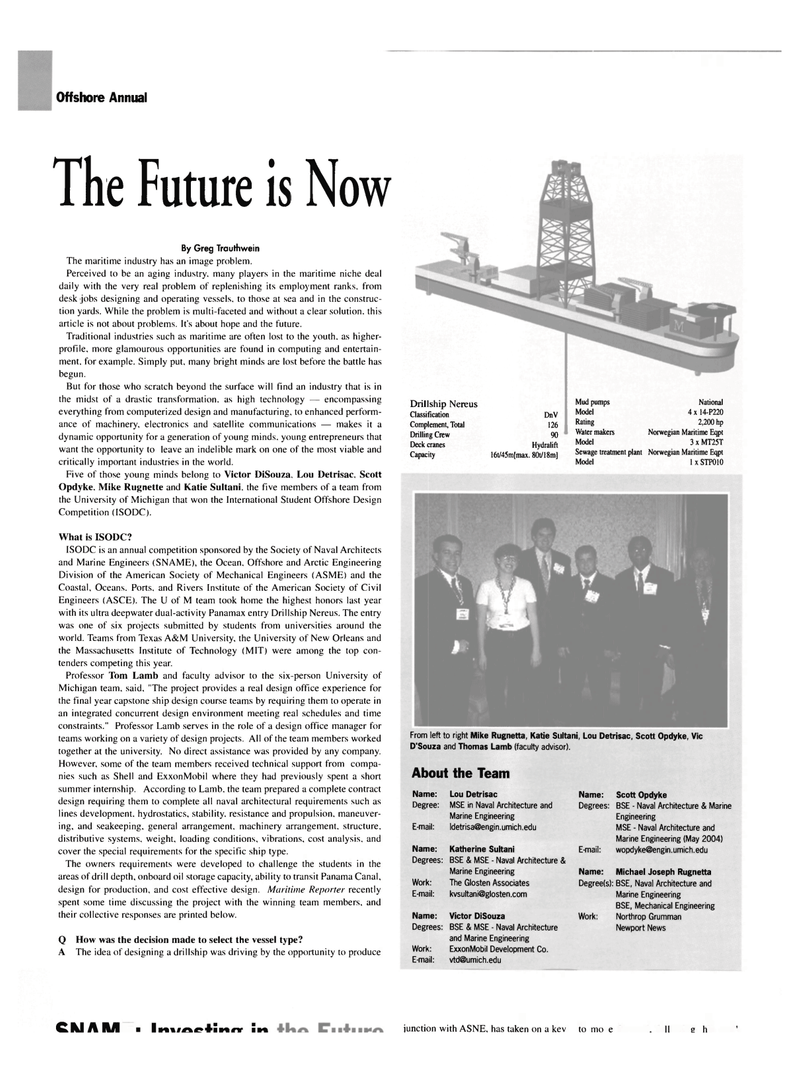
Page 30: of Maritime Reporter Magazine (April 2004)
Offshore Technology Yearbook
Read this page in Pdf, Flash or Html5 edition of April 2004 Maritime Reporter Magazine
Offshore Annual
Drillship Nereus
Classification
Complement, Total
Drilling Crew
Deck cranes
Capacity
DnV 126 90
Hydralift 16t/45m[max. 80t/18m]
Mud pumps
Model
Rating
Water makers
Model
National 4 x 14-P220 2,200 hp
Norwegian Maritime Eqpt 3 x MT25T
Sewage treatment plant Norwegian Maritime Eqpt
Model " 1 x STP010
About the Team
The Future is Now
From left to right Mike Rugnetta, Katie Sultani, Lou Detrisac, Scott Opdyke, Vic
D'Souza and Thomas Lamb (faculty advisor).
Name:
Degree:
E-mail:
Name: Degrees:
Work:
E-mail:
Name:
Degrees:
Work:
E-mail:
Lou Detrisac
MSE in Naval Architecture and
Marine Engineering [email protected]
Katherine Sultani
BSE & MSE - Naval Architecture &
Marine Engineering
The Glosten Associates [email protected]
Victor DiSouza
BSE & MSE - Naval Architecture and Marine Engineering
ExxonMobil Development Co. [email protected]
Name: Scott Opdyke
Degrees: BSE - Naval Architecture & Marine
Engineering
MSE - Naval Architecture and
Marine Engineering (May 2004)
E-mail: [email protected]
Name: Michael Joseph Rugnetta
Degree(s): BSE, Naval Architecture and
Marine Engineering
BSE, Mechanical Engineering
Work: Northrop Grumman
Newport News
By Greg Trauthwein
The maritime industry has an image problem.
Perceived to be an aging industry, many players in the maritime niche deal daily with the very real problem of replenishing its employment ranks, from desk jobs designing and operating vessels, to those at sea and in the construc- tion yards. While the problem is multi-faceted and without a clear solution, this article is not about problems. It's about hope and the future.
Traditional industries such as maritime are often lost to the youth, as higher- profile, more glamourous opportunities are found in computing and entertain- ment, for example. Simply put. many bright minds are lost before the battle has begun.
But for those who scratch beyond the surface will find an industry that is in the midst of a drastic transformation, as high technology — encompassing everything from computerized design and manufacturing, to enhanced perform- ance of machinery, electronics and satellite communications — makes it a dynamic opportunity for a generation of young minds, young entrepreneurs that want the opportunity to leave an indelible mark on one of the most viable and critically important industries in the world.
Five of those young minds belong to Victor DiSouza. Lou Detrisac. Scott
Opdyke. Mike Rugnette and Katie Sultani. the five members of a team from the University of Michigan that won the International Student Offshore Design
Competition (ISODC).
What is ISODC?
ISODC is an annual competition sponsored by the Society of Naval Architects and Marine Engineers (SNAME), the Ocean. Offshore and Arctic Engineering
Division of the American Society of Mechanical Engineers (ASME) and the
Coastal, Oceans, Ports, and Rivers Institute of the American Society of Civil
Engineers (ASCE). The U of M team took home the highest honors last year with its ultra deepwater dual-activity Panamax entry Drillship Nereus. The entry was one of six projects submitted by students from universities around the world. Teams from Texas A&M University, the University of New Orleans and the Massachusetts Institute of Technology (MIT) were among the top con- tenders competing this year.
Professor Tom Lamb and faculty advisor to the six-person University of
Michigan team, said, "The project provides a real design office experience for the final year capstone ship design course teams by requiring them to operate in an integrated concurrent design environment meeting real schedules and time constraints." Professor Lamb serves in the role of a design office manager for teams working on a variety of design projects. All of the team members worked together at the university. No direct assistance was provided by any company.
However, some of the team members received technical support from compa- nies such as Shell and ExxonMobil where they had previously spent a short summer internship. According to Lamb, the team prepared a complete contract design requiring them to complete all naval architectural requirements such as lines development, hydrostatics, stability, resistance and propulsion, maneuver- ing, and seakeeping. general arrangement, machinery arrangement, structure, distributive systems, weight, loading conditions, vibrations, cost analysis, and cover the special requirements for the specific ship type.
The owners requirements were developed to challenge the students in the areas of drill depth, onboard oil storage capacity, ability to transit Panama Canal, design for production, and cost effective design. Maritime Reporter recently spent some time discussing the project with the winning team members, and their collective responses are printed below.
Q How was the decision made to select the vessel type?
A The idea of designing a drillship was driving by the opportunity to produce
CKI AMCa ImiArtinrr !M junction with ASNE, has taken on a kev to move forward, following this vear's

 29
29

 31
31
